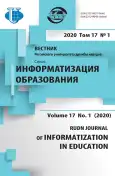Проектирование системы электронных учебных материалов для дистанционного посттренингового сопровождения при корпоративном обучении
- Авторы: Заславская О.Ю.1, Левченко М.С.2
-
Учреждения:
- Московский городской педагогический университет
- Международная группа фармацевтических компаний «STADA»
- Выпуск: Том 17, № 1 (2020)
- Страницы: 36-48
- Раздел: ЭЛЕКТРОННЫЕ СРЕДСТВА ПОДДЕРЖКИ ОБУЧЕНИЯ
- URL: https://journal-vniispk.ru/2312-8631/article/view/321236
- DOI: https://doi.org/10.22363/2312-8631-2020-17-1-36-48
- ID: 321236
Цитировать
Полный текст
Аннотация
Проблема и цель. В статье рассмотрены способы организации электронных учебных материалов для посттренингового сопровождения. Актуальность статьи определяется, с одной стороны, внешними потребностями к расширению сферы образования, задачами дальнейшего развития информатизации образования, а с другой стороны, внутренними потребностями развития информационной культуры обучающихся [1; 13; 6-8]. Проблема определяется наличием противоречия между существующим высоким дидактическим потенциалом дистанционного посттренингового сопровождения, важностью такого обучения для эффективной подготовки обучающихся и отсутствием такого обучения, реализованного на использовании структурного подхода при проектировании и использовании системы электронных учебных материалов. Цель статьи заключается в описании подходов к разработке и апробации реализованных на основе структурного подхода системы электронных учебных материалов для организации посттренингового сопровождения с использованием технологий дистанционного обучения. Методология. Методологической основой послужили идеи реализации дистанционного обучения, представленные в работах А.А. Андреева, Е.С. Полат, В.И. Солдаткина и др.; основные положения теории технологизации процесса обучения, которые исследовали В.П. Беспалько, П.И. Пидкасистый, Г.К. Селевко, А.М. Сохор и др.; вопросы структурирования учебных материалов, которые рассматривали И.В. Акимова, А.И. Архипова, Ю.И. Аскерко, И.В. Буров, С.А. Бутаков, Л.П. Воронина, Д.В. Данилов, А.М. Сохор, О.Е. Филиппов, Л.С. Чернышов и др. Научные статьи, посвященные вопросам корпоративного обучения и развития персонала, представлены такими авторами, как А. Бычков, О. Дугина, Ж. Завьялова, И. Колодкина, А. Корольков, А. Матвеев, А. Мирошниченко, О. Найдёнов, М.В. Кларин, А. Новикова, Н. Титова, Н. Хрящева, О. Эмих, А. Сатвалов. Результаты. Обоснованы целесообразность использования технологий дистанционного обучения при реализации посттренингового сопровождения обучающихся, а также применение структурного подхода к проектированию и использованию системы учебных материалов для дистанционного посттренингового сопровождения обучающихся. Выявлены принципы и условия использования структурного подхода как оснований для проектирования и использования специальным образом подобранных учебных материалов, систематизированных в виде набора компетенций и представленных с помощью дистанционных форм обучения. Отобраны информационные и телекоммуникационные технологии и ресурсы сети Интернет, позволяющие организовать дистанционное посттренинговое сопровождение с учетом индивидуальной траектории обучения. Заключение. Результаты позволили сделать вывод, что эффективность предложенных подходов к отбору, проектированию и использованию системы учебных материалов позволяет учитывать следующие аспекты: учет параметров обучения, уровень развития, уровень сформированной компетентности, уровень развития мотивации. Предложенная модель дистанционного посттренингового сопровождения обучающихся на примере дисциплины «Информационные технологии в управлении образовательным процессом», основанная на использовании структурного подхода, содержащая специальным образом составленную систему электронных учебных материалов, позволила повысить эффективность обучения магистрантов и выстроить индивидуальный маршрут обучения.
Об авторах
Ольга Юрьевна Заславская
Московский городской педагогический университет
Автор, ответственный за переписку.
Email: zaslavskaya@mgpu.ru
доктор педагогических наук, профессор, профессор кафедры информатизации образования Института цифрового образования
Российская Федерация, 127521, Москва, ул. Шереметьевская, 29Майя Стевановна Левченко
Международная группа фармацевтических компаний «STADA»
Email: mslevchenko@yandex.ru
менеджер международной группы фармацевтических компаний «STADA».
Российская Федерация, 119017, Москва, ул. Большая Ордынка, д. 44, стр. 4Список литературы
- Abdullaev SG. Ocenka effektivnosti sistemy distancionnogo obucheniya [Evaluating the effectiveness of the distance learning system]. Telekommunikacii i informatizaciya obrazovaniya [Telecommunications and informatization of education]. 2007;(3):85–92.
- Arhipova AI. Postroenie elektronnogo obrazovatel'nogo resursa na osnove sistemnostrukturnogo podhoda [Building an electronic educational resource based on a systemstructural approach]. Available from: http://icdau.kubsu.ru/EOR_matem/struk_proizv/ files/metod.html (accessed: 20.09.2019).
- GOST R 53620-2009. Informacionno-kommunikacionnye tekhnologii v obrazovanii [Information and communication technologies in education]. Moscow: Standartinform Publ.; 2018.
- Grinshkun VV. Vliyanie kachestva informacionnyh resursov na formirovanie gotovnosti pedagogov k informatizacii obrazovaniya [Influence of the quality of information resources on the formation of teachers' readiness for informatization of education]. Available from: https://cyberleninka.ru/article/n/vliyanie-kachestva-informatsionnyhresursov-na-formirovanie-gotovnosti-pedagogov-k-informatizatsii-obrazovaniya (accessed: 20.09.2019).
- Davydova IP, Lebedeva MB, Mylova IB et al. Pedagogam o distancionnom obuchenii [To teachers about distance learning]. Saint Petersburg: RCOKOiIT Publ.; 2009.
- Zaslavskaya OYu. Informatizaciya obrazovaniya: novoe ponimanie mesta i roli uchitelya v uchebnom processe [Informatization of education: a new understanding of the teacher's place and role in the educational process]. Vestnik Moskovskogo gorodskogo pedagogicheskogo universiteta. Seriya: Informatika i informatizacija obrazovanija [Bulletin of the Moscow City Pedagogical University. Series: Informatics and Informatization of Education]. 2007;(9):81–82.
- Zaslavskaya OYu. Obrazovanie vzroslyh: sostoyanie, problemy, perspektivy [Adult education: state, problems, prospects]. Novye znaniya [New knowledge]. 2004;(1):8.
- Zaslavskaya OYu. Trebovaniya k podgotovke uchitelya informatiki v usloviyah realizacii deyatel'nostnogo podhoda [Requirements for training a computer science teacher in the conditions of implementation of the activity approach]. Bulletin of Peoples’ Friendship University of Russia. Series: Informatization in Education]. 2010;(3):21–27.
- Kiselev GM, Bochkova RV. Informacionnye tekhnologii v pedagogicheskom obrazovanii [Information technologies in pedagogical education]: textbook. Moscow: Dashkov i K Publ.; 2018.
- Klarin MV. Korporativnyj trening, nastavnichestvo, couching [Corporate training, mentoring, coaching]. Moscow: Yurajt Publ.; 2017.
- Koshkina EN. SWOT-analiz primeneniya distancionnogo obucheniya v Rossii [SWOTanalysis of distance learning in Russia]. Available from: https://cyberleninka.ru/article/ n/swot-analiz-primeneniya-distantsionnogo-obucheniya-v-rossii (accessed: 20.09.2019).
- Kobzeva VV, Baranova GV. Rukovoditelyu ob obuchenii personala: dizajn posttreninga [Head of staff training: post-training design]. Moscow: Dobraya kniga Publ.; 2006.
- Lebedeva MB, Agaponov SV, Goryunova MA, Kostikov AN, Kostikova NA et al. Distancionnye obrazovatel'nye tekhnologii: proektirovanie i realizaciya uchebnyh kursov [Distance learning technologies: design and implementation of training courses]. Saint Petersburg: BHV-Peterburg Publ.; 2010.
- Makarov YuV. Psihologiya professional'nogo posttreningovogo soprovozhdeniya [Psychology of professional post-training support]. Available from: https://cyberleninka.ru/article/ n/psihologiya-professionalnogo-posttreningovogo-soprovozhdeniya (accessed: 20.09.2019).
- Samylkina NN. Sovremennye sredstva ocenivaniya rezul'tatov obucheniya [Modern means of evaluating learning outcomes]. Moscow: BINOM. Laboratoriya Znanij Publ.; 2007.
- Senge PM. Pyataya disciplina. Iskusstvo i praktika obuchayushchejsya organizacii [The fifth discipline. The art and practice of a learning organization]. Moscow: Mann, Ivanov i Ferber Publ.; 2018.
Дополнительные файлы









